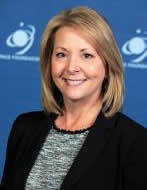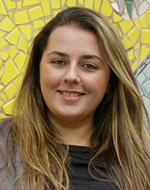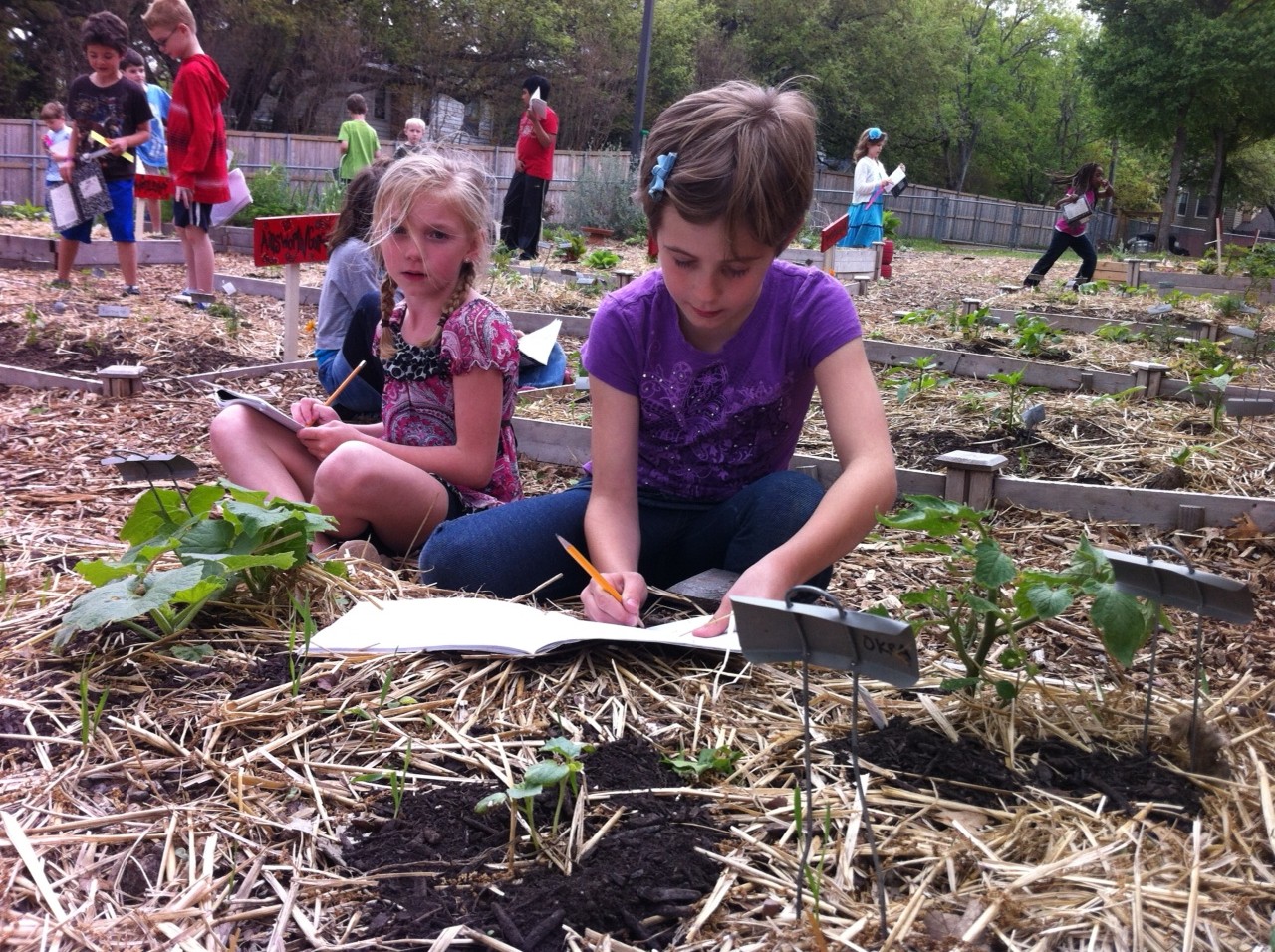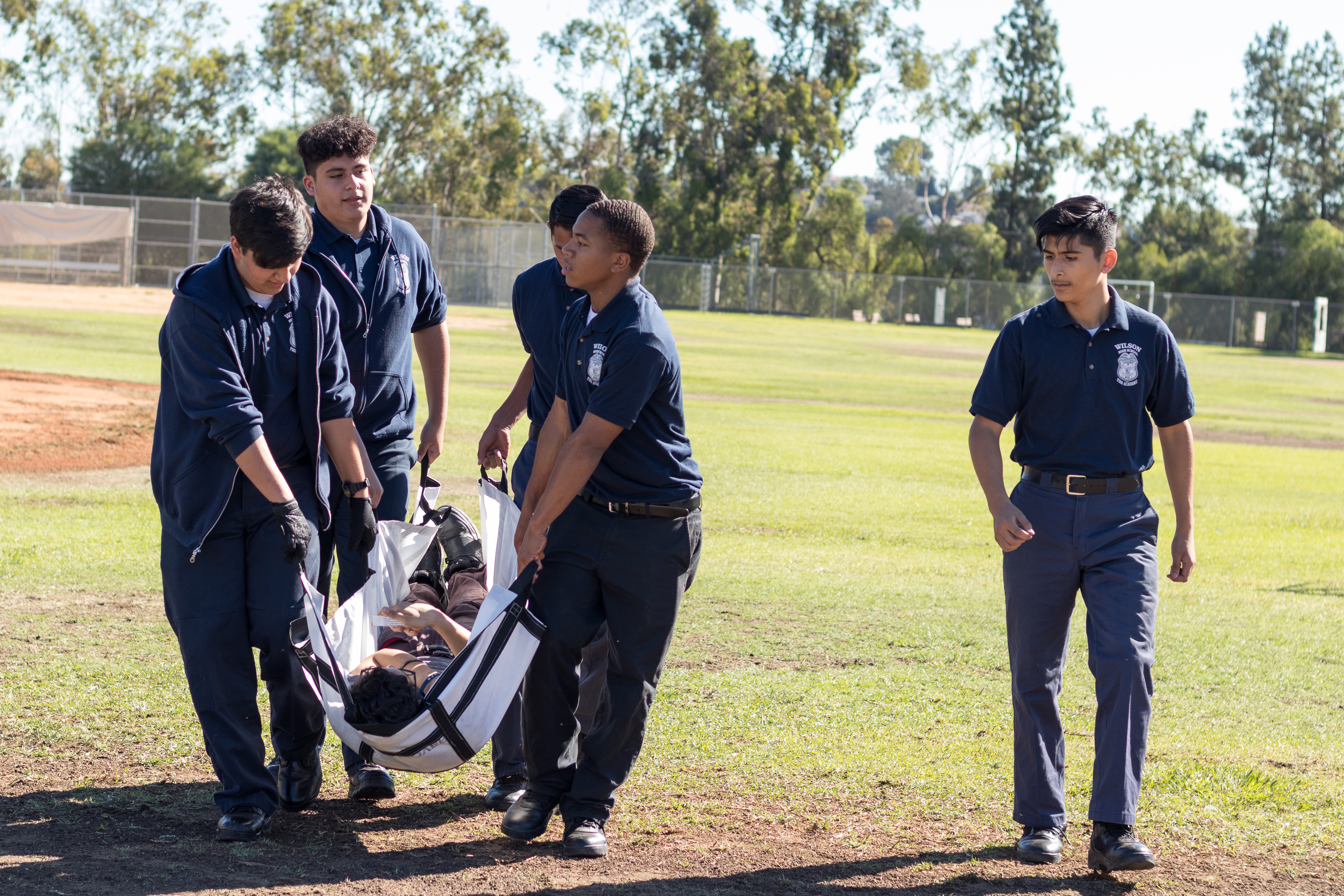The mission of NSTA is to promote excellence and innovation in science teaching and learning for all.
Follow NSTA
By NSTA Web Director
Posted on 2019-10-04

Lori Nelson is committed to STEM education through her classroom instruction, applying for grants, pursuing professional development, creating school STEM events, and sharing ideas with other teachers. She is the sponsor of the Chaffee Greenpower Engineering Team and a lead teacher for the Project Lead the Way engineering program. In 2011 Nelson created Chaffeetopia, an annual STEM festival, which is a space-themed event featuring hands-on science and engineering activities. In 2012 she collaborated with a NASA engineer to create an annual, weeklong curriculum to teach students how to build and launch rockets. Nelson has presented several sessions at the Alabama Science Teachers Association annual conference, the National Science Teachers Association annual conference, and the Space Port Area Conference for Educators. She has received several awards for science education, including the National Science Teachers Association Maitland Simmons Award, the Air Force State Teacher of the Year, the Alabama Science Teachers Association Elementary Science Teacher of the Year, and the National Space Club Educator of the Year. Parent Meghan Nester says, “One of the things that is most impressive to me about Mrs. Nelson, actually happens outside of the classroom. She tirelessly works to expand her own knowledge base and continually have more to offer her students. From summer camps and conferences, to developing a network of local connections that can add to her students’ learning experience, Mrs. Nelson is a true example of a lifelong learner.”
Visit the NSTA website for more information on the Sylvia Shugrue Award for Elementary School Teachers.

By NSTA Web Director
Posted on 2019-10-04

As a teacher in Philadelphia, the most significant obstacle that Jayda Pugliese has encountered is the lack of resources due to budget constraints. When she arrived at her current school as a fifth-grade science and mathematics teacher, there were no science books or materials for grades K–6. She overcame this obstacle by writing for competitive grants and obtained over $20,000 for various science-based initiatives, such as a rooftop garden and materials for the school (textbooks, microscopes, glassware). She also wrote and received a grant that helped place fully stocked Chromebook carts in ten classrooms to incorporate more technology. Concetta D’Alessandro, School-Based Teacher Leader at Andrew Jackson Elementary School, says Pugliese “has broadened my perspective as an educator because of her extensive involvement with the school and her passion to make science accessible to both the students and the community.” Pugliese also raised money for a MakerBot 3D Printer, which has allowed students to build and donate a usable, prosthetic hand for a four-year-old girl within the community. Currently, her students are creating a prosthetic leg for a dog in Connecticut. These experiences have allowed Pugliese to turn her science instruction into service learning projects, which has made a significant difference in the level of motivation and tolerance among her students. They are changing the world right from the classroom.
Visit the NSTA website to learn more about the Sylvia Shugrue Award for Elementary School Teachers.

By Carole Hayward
Posted on 2019-10-02
Fans of Oprah Winfrey know the phrase, “When you know better, you do better.” And now Page Keeley and Joyce Tugel, authors of Science Curriculum Topic Study, 2nd Edition—Bridging the Gap Between Three-Dimensional Standards, Research, and Practice, are offering the perfect way for science teachers to know better and do better. In the first national workshop for Science Curriculum Topic Study, in Des Moines Iowa, on October 8, they’ll introduce participants to the new, updated Curriculum Topic Study (CTS) tools and processes for linking disciplinary content, scientific and engineering practices, and crosscutting concepts to research on learning and teacher practice.
Bring a team and learn how to use CTS as a teacher or leader.
CTS has been called the “missing link” between science standards, teacher practice, and improved student achievement. It begins with questions that help you center your teaching. For instance:
Much of the workshop will be based on the NSTA Press book Science Curriculum Topic Study, 2nd Edition—Bridging the Gap Between Three-Dimensional Standards, Research, and Practice, which is newly mapped to the Framework for K–12 Science Education and the Next Generation Science Standards (NGSS), and updated with new standards and research-based resources. Attendees will learn to make the shifts needed to reflect current practices in curriculum, instruction, and assessment. The methodical study process used will help educators intertwine content, practices, and crosscutting concepts.
What will the Science CTS do for your school?
Why will the Science Curriculum Topic Study Workshop be a game changer for you? In the words of Nevada science teacher Gail B: “I wish I’d had this years ago! It took all the work out of looking up standards and how to apply them to students.” Just a few of the ways schools and districts change what they’re doing right away include:
This standards- and research-based versatile process can be used by individuals or professional learning groups and supports implementation of any two- or three-dimensional standards, including the NGSS.
A follow-up web seminar, to be scheduled after the workshop, will support participants as they use CTS in their district or professional learning setting.
All participants will receive:
Meet the Presenters
Best-selling authors Page Keeley and Joyce Tugel will be there to guide learning, share insights, and answer questions. Page and Joyce have been science education colleagues and professional development partners for two decades, and they worked together on the original NSF-funded Curriculum Topic Study (CTS) project. As Page developed the first CTS process and authored the first edition, Joyce was instrumental in field testing and implementing the CTS professional development designs.
Your Path to Success Starts Here
By Debra Shapiro
Posted on 2019-10-02

“It is important for elementary students to learn about agriculture because there is a lot of illiteracy when it comes to agriculture. Social media is a main contributor to ag-illiteracy because there are a lot of negative social media campaigns out there…No one looks at the science-based facts, but instead [they believe] what they read,” contends high school student Katelyn Young, vice president of the Arcadia Valley Career Technology Center Future Farmers of America (FFA) Chapter in Ironton, Missouri. She earned certification to teach third graders the Ag-Ed on the Move curriculum (see www.agmoves.com) from Missouri Farmers Care, an organization promoting the continued growth of Missouri agriculture and rural communities.
Young says it’s crucial “to push that positive message across to students who don’t know much about agriculture. These kids are three to five generations removed from the farm. Elementary school is such an important learning time for kids, so what better time to teach them about agriculture? These kids are growing up in a world where the population will be [more than] nine billion in the year 2050. It will be these kids’ job to figure out how to feed the growing world.”
“Almost everything we do is related to food,…[and students need to know that] agriculture careers involve more than just farming,” maintains retired teacher Darleen Horton of Louisville, Kentucky, who contributed lessons to the book Ready, Set, Grow: A Kentucky Educator’s Guide to School Gardens and Hands-On STEAM Learning (available free at www.kyreadysetgrow.org). “Some agriculture jobs are lab jobs,” she points out, while some “involve food already grown,” such as restaurant jobs and careers “connected with the business end of food.” She adds, “Students need to understand the economics of farming, such as gas costs,…and natural ways to garden that help the environment.”
Horton notes that “elementary students embrace what you teach them” and what they learn “can impact their families, who can [be inspired by young students to] learn to recycle and grow plants and food.”
“There’s not a lot of food grown in North Texas, and we’re in the city,… [so] students don’t understand food production,” says Kim Aman, retired teacher and now program director of Moss Haven Farm, located at Moss Haven Elementary School in Dallas, in the Richardson Independent School District. It’s important to reach elementary students because “they will be the future policy makers, shoppers, and buyers,” she asserts.
In addition, agriculture connects with topics like healthy eating. “There are 10-year-olds who already have type 2 diabetes,” Aman points out, so teaching agriculture to young students could positively affect their health. Aman has written related preK–5 curriculum for the American Heart Association and Whole Kids Foundation.
“Some students are scared [initially about farm work]. Some are afraid to get their hands dirty, or to eat radishes, or to be near bees,” Aman relates. She helps them overcome their fears, especially of bees. “I teach them not to be scared of bees and how to act around them.” Most students, she notes, “are pretty interested [in agriculture] because it’s novel to them; they don’t get outside much.” And for students who struggle in school, “digging up worms and growing plants levels the playing field for them.”
Tara Kristoff, curriculum director for Rock Falls School District 13 in Rock Falls, Illinois, partnered with local farm bureaus for teacher professional development in agriculture and resources for students. In her prior school district, where she was a curriculum director, teachers initially weren’t receptive to teaching about agriculture.
“We had representatives from the [Cook County Farm Bureau] show our teachers…how they can link trade books with science and social studies to teach agriculture,” says Kristoff. “[Teachers] understand the science of growing corn and soybeans, but with literature [added], they really get enthusiastic” because they can teach it in their English language arts block.
“For example, our fourth-grade teachers taught a unit on pigs. The students learned that Illinois is a major producer of pork as a staple economy globally, and the importance of raising pigs for food. Then the students read Charlotte’s Web to wrestle with the ethical dilemma [of] raising pigs for food versus a pet. Lastly, the students went for a tour of a pig-raising farm at Fair Oaks Farms in Indiana, where experts explained [how] the life cycle of the pig [relates] to our economy,” Kristoff recalls.
Teaching students that animals can be food sources requires “a delicate balance,” she observes. Younger students simply learn that “we grow pigs in Illinois,” while third and fourth graders discover that “pork is a staple and pigs are part of our food system. The things students eat—pork tamales and bacon, for example—they [learn to] associate with pigs. They understand they’ve been eating it; they just hadn’t realized it,” Kristoff explains.
“In Illinois, agriculture is the most important job, our main source of income and revenue,” she contends. Noting her current school district has 80% of residents living in poverty, she asserts, “It is especially important for me as a director of curriculum to have students understand where their food truly comes from as well as consider agriculture/agribusiness as a future career.”
“I have been incorporating agriculture fairly heavily [over] the past three years,” says Nancy Smith, first-grade teacher at Bentwood Elementary in Overland Park, Kansas. Smith says she finds it easy to blend agriculture with science, technology, engineering, and math (STEM), and she starts the school year by teaching “about careers in agriculture and STEM as part of my Labor Day lessons.” Later on, “we talk about farmers’ tools, the axe, the trowel, and the shovel” as part of a STEM lesson.
For her school’s student and family night this year, she will incorporate agriculture throughout the event. “The stations will be all agriculture-related. [For example,] Kansas Corn [an organization comprised of the Kansas Corn Growers Association and the Kansas Corn Commission] will have a station. [Students from all grade levels and their families] will learn about Kansas agriculture and do hands-on activities,” she relates.
“I invited a farmer who uses drones to examine his crops. He will demonstrate his drones at the event and explain why he uses them,” she reports.
When she can’t bring students to a farm, Smith takes them on virtual field trips to farms. She also invites high school students from the local FFA chapter “to design activities and centers for my students. This has an impact on the high school students as well,” she observes.
To prepare to celebrate the state holiday Kansas Day ( January 29, the day Kansas was admitted to the United States), Smith will have her students spend a week researching a school lunch that will feature ingredients produced on Kansas farms. “I’ll have farmers and grocery store employees come in,” she relates. “The students will look at the nutritional values and costs of the food. They’ll pitch [their menu] to the food service workers at our school [and ask them] to serve it next year.”
This article originally appeared in the October 2019 issue of NSTA Reports, the member newspaper of the National Science Teachers Association. Each month, NSTA members receive NSTA Reports, featuring news on science education, the association, and more. Not a member? Learn how NSTA can help you become the best teacher of science you can be.
The mission of NSTA is to promote excellence and innovation in science teaching and learning for all.
Follow NSTA

By Debra Shapiro
Posted on 2019-10-02

After learning about fire dynamics— how fires start, spread, and develop— and doing hands-on activities with firefighters, eighth graders in Georgia’s Cobb County School District solve a virtual fire-related crime with help from an arson investigator as part of a partnership involving the district’s middle schools, the Cobb County Fire Department, and Underwriters Laboratories (UL). UL offers a free module that the district’s eighth-grade science, technology, engineering, and math (STEM) teachers use, Fire Forensics: Claims and Evidence, on its Xplorlabs online learning platform (see the unit at http://bit.ly/2lKh81k). “I saw [UL staff] at an NSTA conference and heard about UL’s fire dynamics curriculum,” recalls Sally Creel, the district’s STEM and innovation supervisor. “Our goal is to put students in contact with [workers] in STEM fields,” so partnering with UL and the fire department has helped provide students with authentic STEM learning, she observes.
“We don’t get a lot of kids wanting to fight fires,” says Sean Gray, Cobb County Fire Department captain and a member of the UL Firefighter Safety Research Institute’s Advisory Board. By exposing students to the UL curriculum and the roles of fire service professionals, “we hope they will be interested [in a fire service career] and stay with the community if they’re not going on to college,” he explains, adding that “the middle level is an important time to reach kids.”
Students experience “the excitement of having firefighters in their classroom,” says Creel. “The firefighters come in uniform, and we make sure to have a diverse group of firefighters” so all students can relate to the material. “The program is authentic and memorable,” she maintains.
Firefighters co-teach the lessons with teachers, and they train together to use the curriculum. “We’ve now trained 80 firefighters and 50 to 60 teachers at the middle and high school levels,” Gray reports.
The UL curriculum “is set up as a scenario, as in problem-based learning. Students have to discover what happened: an accident or arson,” Creel explains. The material also supports the Next Generation Science Standards and three-dimensional learning because it “integrates science and engineering practices, doing research and digging into data to determine what happened,” she points out. “Fire and how it behaves [serves as] the phenomenon, and students draw conclusions based on data and UL research.”
Michael Stecher, science teacher, and Amber Schick, English language artsteacher at Liberty Middle School (LMS) in Fargo, North Dakota, have served as team advisors for students competing in eCYBERMISSION, a web-based STEM competition for students in grades 6–9 sponsored by the U.S. Army Educational Outreach Program and administered by NSTA (www.ecybermission.com). As part of eCYBERMISSION, students identify community problems and explore science explanations and engineering solutions. This year, one LMS team focused on kitchen fires. “They realized most kitchen fires are grease fires,” says Stecher, and after polling other students about how they would extinguish those fires, “most students said they would put water on the grease fire,” which makes the fire worse. The team decided “an awareness campaign and a device was needed,” he relates.
The teachers helped the team research what products extinguish grease fires. Their first proposed prototype was a pan equipped with a device “that had a button you could press to make sand come out and put out the fire,” Stecher recalls. After further research, the team “decided that a small blanket could be [thrown over] a pan and put out the fire because it eliminated oxygen,” he reports.
Working with the West Fargo Fire Department in a controlled environment outdoors, the students tested four prototypes on a pan of burning vegetable oil to determine whether the blanket should contain sand, baking soda, or salt or if a blanket containing nothing would do the job. The students learned that baking soda and sand worked best, and the blanket containing nothing “was the worst because it didn’t have the weight to put out the fire,” says Stecher.
Schick notes that the students wanted their blanket to be reusable, but they learned “the material wasn’t flame retardant, so [the blanket] couldn’t be reused.”
The project “gave students an understanding of how to do science and how to test [prototypes] as part of the engineering design process,” Stecher maintains. “It was meaningful to them because lives could be saved, and [it provided] a community tie-in with the West Fargo Fire Department. It brought science to life in my class.”
Doing projects like this one “gives research meaning, why it’s important to research and understand the problem,” Schick contends. The project “gave them skills and expertise and was an authentic learning piece, more than just writing a paper. The students were excited and passionate, and there was 100% integration with my subject— the best way to do research.”
Wilson High School in Los Angeles, California, offers a Firefighter Academy Magnet in collaboration with the Los Angeles City Fire Department (LAFD) for students interested in learning about a career in fire service and emergency response. As part of the magnet, chemistry teacher Deborah Wang teaches Firefighting Technology, a course covering science, technology, and research with a focus on firefighting. “It’s nice to integrate occupations like firefighters. It can bring more interest and relevance to students,” she observes.
The course is open to all Wilson students. “Some students want to learn more about [firefighting] careers; others take it as an elective requirement,” Wang explains.
Firefighting Technology also covers engineering, history, architecture, and philosophy; “it’s an interdisciplinary study through a firefighting lens,” says Wang. Her students learn about architecture by studying building codes and determining whether they comply with fire codes. “We mapped our school’s building plan [and wondered] how we could get water to the fourth or fifth floor,” Wang recalls.
Students learn “the history of how [firefighting] technology has progressed. [Firefighters] used to have only water and buckets, then fire extinguishers,” Wang relates. During World Wars I and II, firefighters “learned that carbon tetrachloride was not good to use in fire extinguishers because it damages the lungs…Now there are high-tech fire extinguishers with less harmful chemicals.”
She continues, “Because we work with the [LAFD], they give us uniforms and field trips…[For example,] I took my ninth graders to the [LAFD] Museum last year. It [gave them] background for my class [when they saw] the museum’s artifacts.” Her students also worked with the LAFD to do a fire inspection.
The firefighter magnet is valuable, according to Wang, because “the field for first responders and firefighters is really rigorous. Having more candidates who are better prepared is important for the field’s future and the safety of our communities.”
This article originally appeared in the October 2019 issue of NSTA Reports, the member newspaper of the National Science Teachers Association. Each month, NSTA members receive NSTA Reports, featuring news on science education, the association, and more. Not a member? Learn how NSTA can help you become the best teacher of science you can be.
The mission of NSTA is to promote excellence and innovation in science teaching and learning for all.
Follow NSTA
